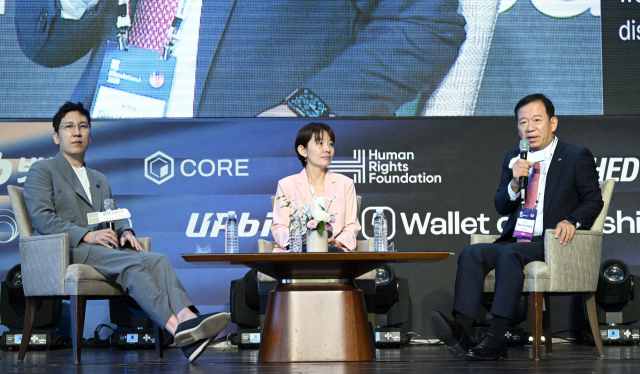
As discussions on the institutionalization of Bitcoin spot ETFs intensify, domestic asset management companies are also assessed to have sufficient competitiveness in the global market. The analysis suggests that Korean-style ETFs could have differentiated competitiveness in terms of creative product design and investor convenience.
At the 'Bitcoin Seoul 2025' on the 5th, Seo Yoo-seok, chairman of the Financial Investment Association, said during a discussion on 'Korean Financial Market and the Necessity and Challenges of Bitcoin ETF Introduction', "One of the biggest strengths of Korean asset managers is creativity and flexibility," and "There is no need to track only a single asset like ETFs listed in the US." The IBIT by BlackRock and FBTC by Fidelity traded in the US market are all structured to directly reflect Bitcoin prices.
Related Articles
- "Discussing Bitcoin incorporation strategy with Korean listed companies... Korean-style strategy will come out in 2-3 months" [Bitcoin Seoul 2025]
- "Cryptocurrency spot ETF, limited to Bitcoin, etc... More stable than direct investment" [Bitcoin Seoul 2025]
- El Salvador Education Organization "Bitcoin Popularization, Culture More Critical Than Technology" [Bitcoin Seoul 2025]
- "Designated as US Strategic Asset... Bitcoin Will Accelerate Real-Life Payment Expansion" [Bitcoin Seoul 2025]
The chairman said, "It's possible to mix Bitcoin and Ethereum or combine them with listed stocks and bonds," and "By utilizing covered call strategies to enhance dividend income, we can provide more diverse customized products to domestic investors."
Kim Seo-jun, CEO of Hashd, also emphasized, "Bitcoin is a standardized asset where exposure is the same regardless of who manages it," and "What ultimately matters is the competition of who can design more conveniently and advantageously from the investor's perspective." He added, "Domestic ETFs have easier tax reporting and are traded during domestic market hours," and "In case of disputes, the ability to respond within the domestic institutional framework increases investor convenience." From this perspective, domestic ETFs could have higher competitiveness than global products.
Expectations are also growing for the Lee Jae-myung government, which promised to allow Bitcoin ETFs. During his presidential candidacy, President Lee proposed introducing cryptocurrency spot ETFs and issuing won-denominated stablecoins under the plan to develop South Korea into a digital asset hub. The US allowed Bitcoin spot ETFs last January. According to CoinMarketCap, the AUM of US Bitcoin spot ETFs on this day amounts to 130 billion dollars (approximately 176.878 trillion won).
The chairman said, "There are concerns that Korea might remain isolated in the global digital asset market like the Galapagos," and "As the new government has promised to allow cryptocurrency ETFs, I hope the institutionalization discussions will be made progressively." He added, "Discussions with authorities are actually proceeding much more deeply than before," and "Once the policy direction is set, the related ecosystem including asset managers, securities firms, custodian firms, and prime brokers can be quickly established." He further noted that "Some major asset managers are already preparing to launch products."
The CEO said, "Looking at how major candidates in this election presented cryptocurrency policies as campaign promises, there's a possibility of institutional changes breaking through barriers," and "I hope the market environment will turn more friendly in the second half of this year."
If Bitcoin ETF institutionalization becomes a reality, it is expected to significantly expand Bitcoin accessibility not only for domestic asset management companies but also for institutional investors and general corporations. This is because ETFs are an institutional means to incorporate cryptocurrencies into portfolios within the capital market. The CEO predicted, "From the moment ETF is listed, institutional capital that previously could not invest in cryptocurrencies can naturally flow in."
The CEO also emphasized the need for proactive institutional improvements for future technologies. He said, "Korea has always been a step behind in institutionalization compared to advanced countries like the US and Japan," and "As creativity and innovation are national competitiveness, we should proactively design regulatory environments for future technologies."
In fact, Hong Kong is accelerating the establishment of its institutional foundation by becoming the first in Asia to allow Bitcoin spot ETFs. Kim Hae-na, a deputy director at Bosera Asset Management, which launched the ETF, explained, "Under the strategy of being an Asian financial hub, Hong Kong has a strong policy will to nurture cryptocurrencies within the institutional framework," and "Even before ETF launch, they had established a system of issuing separate licenses to cryptocurrency exchanges and asset management companies."
- Reporters Do Ye-ri, Kim Byung-jun
< Copyright ⓒ Decenter, reproduction and redistribution prohibited >






